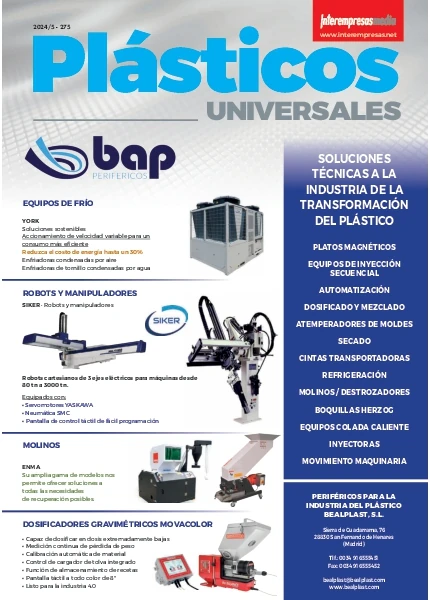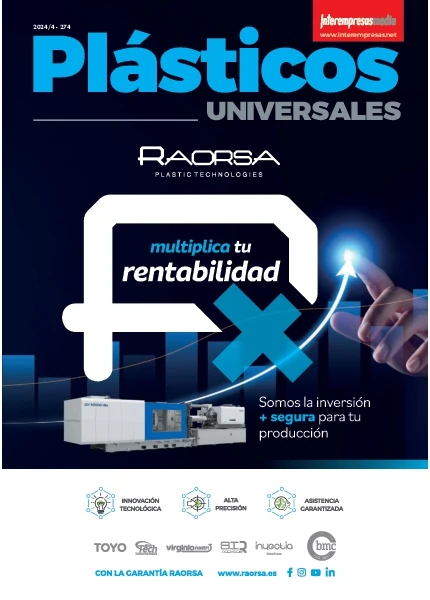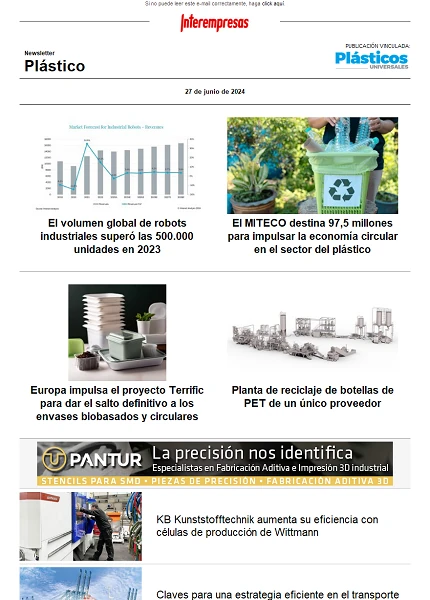Keys to implement a system of quality with success
The transformers have been 'obliged' to improve their processes
Until some years ago, the adaptation of the methodology of work to the implementation of a quality assurance system, such as those managed by the family of ISO 9000 standards, was restricted to the large manufacturing firms, but currently there has been a boom in the incorporation of these working methods also in small plastics processing companies.
The need to work with a system of quality concerted with suppliers, has given rise to that small auxiliary processing industries of plastic, are "obliged" to improve their work processes, incorporating the quality systems as an aid to this improvement, in such a way that can easily demonstrate compliance with the requirements requested by customers.
As a general rule, when a company raises the incorporation of a quality system intended, from an internal point of view, reduce defects and incidents during each stage of manufacture, from the receipt of raw materials to finished product expeditionas well as planned strategies to be followed in each of the unexpected, in order to be kept to a minimum the factor of "surprises" in the manufacture. And, from an external point of view, ensure their ability to fulfil what was agreed in terms of quality to the customer.
It should be clear a number of key points to address, with a minimum of guarantees, the process of implementing a system of quality:
-
The choice of the appropriate regulations.
Within the family of ISO 9000 standards for the quality assurance, ISO 9001, 9002 or 9003, depending on the scope of the system are used. The most complete is ISO 9001, which currently includes 20 requirements, which cover the design, production, installation and after-sales service. The ISO 9002 differs from the previous one in the non-inclusion of the design, focused on companies that do not perform this process. ISO 9003 is directed to the inspection and final testing.
The ISO 9000 regulations are currently in review and a new publication is scheduled for the end of the year 2000.
-
Expert advice.
It is important that anyone with sufficient experience and knowledge on the subject, advice in the interpretation and adaptation of the regulations to the company, since it is a hard work. There should be with a consultancy with industry experience, who know the methods of work used and try to get involved in the improvement of the company towards the quality of products and processes.
It would be necessary that the chosen consultant is accessible and with a proximity to the workplace, which expedited the resolution of specific problems that have appeared during the period of implementation.
-
Control the development of the project.
To perform a proper control of the development of the project it is essential to the creation of a plan of work specifying chronological all actions that are going to carry out, and with a periodic review to verify the degree of compliance, and reorganizing when this plan is necessary to adapt to the pace of implementation has done.
-
Clarification of the structure of the company.
It is essential to begin the process of implementing an organizational structure clearly defined, including the functions of all the personnel in such a way that is differentiated responsibilities and are fully involved throughout the company, from the direction to the operator at the foot of machine, in the project towards the quality.
-
Search for participation.
The participation and involvement of all staff to the project of business quality is needed. To this end, it is desirable to set up working groups to participate actively in the implementation of the quality system, to develop their own tools.
-
Training.
Basic staff training, is essential so that it will help to enhance the participation and understanding of the system.
AIJU has developed an interactive application using three CD Rom, in which, in an illustrative manner and through practical, focused examples industries of plastic, are all concepts of quality gradually, from the most basic to the tools and applications of statistical techniques.
-
Set objectives and measure.....
Another point to consider is the determination of the quality objectives. According to the experience of AIJU, often companies do not have sufficiently quantified the direct and indirect costs produced by the "non quality" in any process of work.
Therefore, we must focus on concrete issues of quality goals, set so that they are measurable and serving as an indicator of the degree of implementation and development of the quality system. From these early indicators that bring a vision of how the company is currently located, must consider the scope of other goals where mark, for example, the reduction of defects (non conformities, claims)(, etc.).
Once implemented the quality system and depending on the business policy and the demands of the markets, the address qualifies for certification by an accredited entity. We must consider that certification should be a consequence of the correct implementation of the rules and not only an end to get in as soon as possible and... at any price.
This is why that, increasingly more companies transformed of plastics will be working with quality systems simply as a form of organization and profit internally, the end will not necessarily be a certification.
Ignacio Mira
Monica Peters
AIJU


































